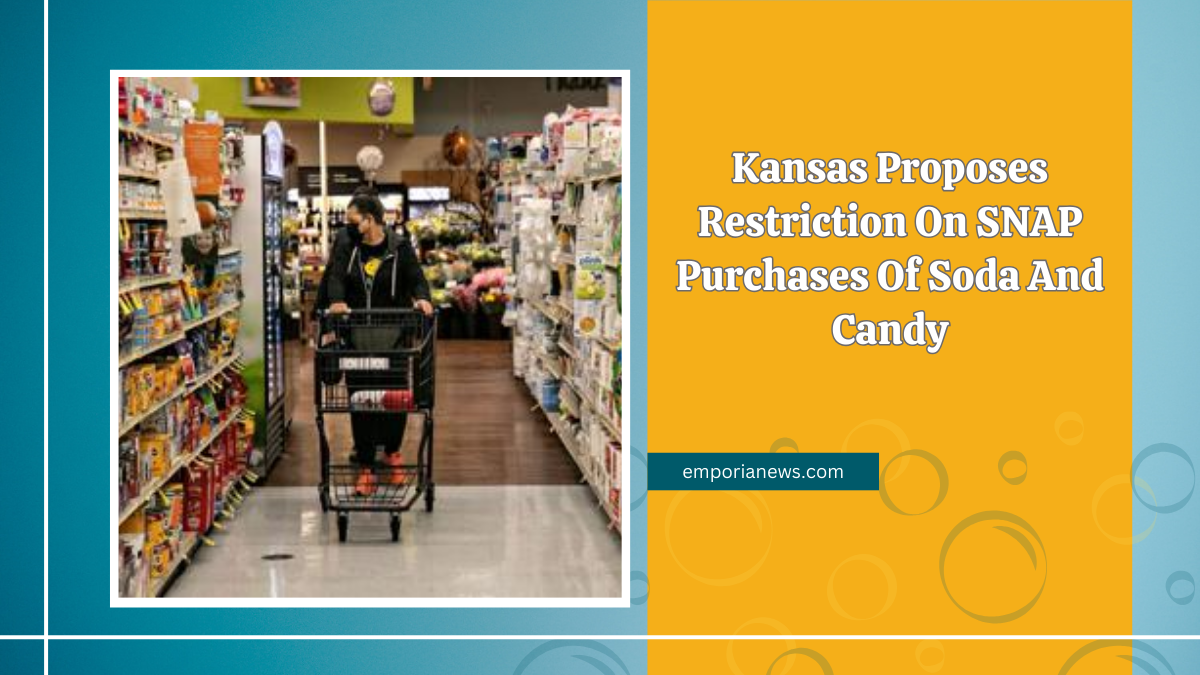Kansas legislators have introduced bills aiming to prohibit the use of Supplemental Nutrition Assistance Program (SNAP) benefits for purchasing soda and candy.
This initiative seeks to promote healthier dietary choices among beneficiaries and ensure that taxpayer funds are utilized for nutritious food options.
Details of the Proposed Legislation
The proposed House Bill 2015 and Senate Bill 79 direct the Kansas Department for Children and Families to seek a federal waiver.
This waiver would allow the state to exclude soft drinks and candy from items eligible for purchase with SNAP benefits.
Definitions Under the Bills
- Soft Drinks: Non-alcoholic beverages containing natural or artificial sweeteners. Beverages with more than 50% fruit or vegetable juice, or those containing milk or milk alternatives, are exempt.
- Candy: Unrefrigerated, flourless confections made from sugar, honey, or other sweeteners combined with chocolate, fruits, nuts, or flavorings, presented in bars, drops, or pieces. Notably, items like Kit Kat and Twix, which contain flour, would remain eligible.
Implications for SNAP Recipients and Retailers
If enacted, the legislation would impact both beneficiaries and retailers:
- Beneficiaries: SNAP users would need to adjust their purchasing habits, focusing on approved food items.
- Retailers: Grocery stores would be required to update their systems to align with the new eligibility criteria, ensuring restricted items cannot be purchased with SNAP benefits.
National Trends and Federal Hurdles
Kansas is not the first state to attempt restricting certain food purchases under SNAP. Previous efforts in states like Maine and New York have been unsuccessful, primarily due to the requirement of federal approval.
The U.S. Department of Agriculture (USDA), which oversees SNAP, has historically been cautious about imposing product-specific bans, citing concerns over complexity and fairness.
Comparison of SNAP Spending Habits
The USDA’s research has shown that both SNAP and non-SNAP households allocate similar portions of their grocery budgets to certain categories, though differences in beverage purchases are notable.
| Food Category | SNAP Households (%) | Non-SNAP Households (%) |
|---|---|---|
| Meat, Poultry, Seafood | 18 | 20 |
| Sweetened Beverages | 5 | 4 |
| Vegetables | 7 | 8 |
| Dairy Products | 6 | 7 |
| Candy and Snacks | 4 | 3 |
Future Steps and Legislative Process
The proposed bills currently remain under review by the Kansas House Welfare Reform Committee and the Senate Committee on Government Efficiency.
If approved by both chambers, the Kansas Department for Children and Families will formally request a federal waiver from the USDA.
The timeline for implementation, if the waiver is granted, could extend into the next fiscal year, given the need for technological updates in grocery store systems and public outreach to inform SNAP users of the new guidelines.
Pros and Cons of the Proposed SNAP Purchase Restrictions
| Pros | Cons |
|---|---|
| Promotes healthier dietary choices | May stigmatize SNAP recipients |
| Aligns taxpayer funds with public health initiatives | Could limit personal freedom in food choices |
| Potentially reduces healthcare costs in the long-term | Implementation may be costly and complex |
| Encourages nutritional education among low-income families | May disproportionately impact those in food deserts |
Kansas’ proposed legislation to restrict SNAP purchases of soda and candy represents a significant step in the ongoing effort to improve public health outcomes through nutritional policy.
While proponents argue that the move encourages responsible use of public funds and healthier lifestyles, opponents raise valid concerns regarding fairness, accessibility, and potential stigma for SNAP recipients.
FAQs
What is the purpose of banning soda and candy purchases with SNAP benefits?
The proposed ban aims to promote healthier eating habits among SNAP recipients and ensure that taxpayer funds are spent on nutritious food.
How will the restrictions be enforced?
Retailers will be required to update their point-of-sale systems to prevent the purchase of restricted items using EBT cards.
When could the new rules take effect?
If both bills pass and the federal waiver is approved, the changes could be implemented within the next fiscal year.




